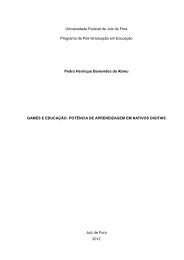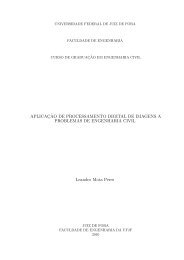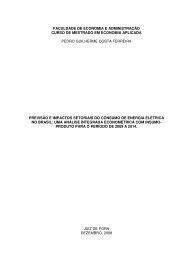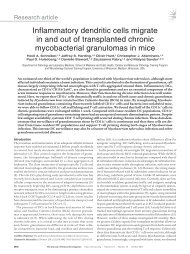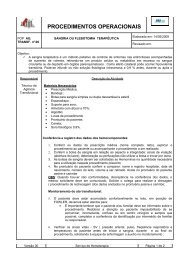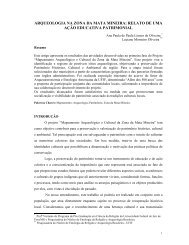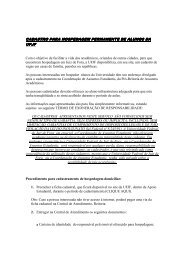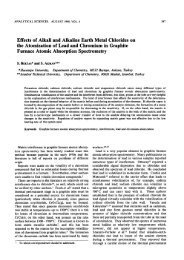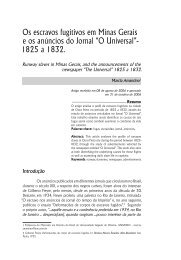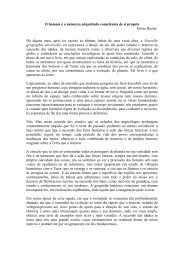Volume 6 | Número 2 Julho - Dezembro de 2012 - Universidade ...
Volume 6 | Número 2 Julho - Dezembro de 2012 - Universidade ...
Volume 6 | Número 2 Julho - Dezembro de 2012 - Universidade ...
You also want an ePaper? Increase the reach of your titles
YUMPU automatically turns print PDFs into web optimized ePapers that Google loves.
Psicologia em Pesquisa | UFJF | 6(02) | 190-192 | <strong>Julho</strong>-<strong>Dezembro</strong> <strong>de</strong> <strong>2012</strong> DOI: 10.5327/Z1982-1247<strong>2012</strong>000200013<br />
I Programa <strong>de</strong> Pós-Graduação em Psicologia, Universida<strong>de</strong> Fe<strong>de</strong>ral <strong>de</strong> Juiz <strong>de</strong> Fora<br />
II Faculda<strong>de</strong> <strong>de</strong> Minas<br />
Consi<strong>de</strong>rado um dos mais respeitados e importantes<br />
pesquisadores em Historiografia da Psicologia, o<br />
professor doutor Horst Gundlach estudou Psicologia<br />
e Filosofia nas universida<strong>de</strong>s alemãs <strong>de</strong> Hei<strong>de</strong>lberg e<br />
München. Suas contribuições incluem numerosos<br />
artigos e livros e a direção <strong>de</strong> dois importantes<br />
centros <strong>de</strong> pesquisas historiográficas na Alemanha,<br />
o Instituto <strong>de</strong> História da Psicologia (Institut für<br />
Geschichte Psychologie), da Universida<strong>de</strong> <strong>de</strong> Passau, e o<br />
Centro Adolf Würth <strong>de</strong> História da Psicologia (Adolf-<br />
Würth-Zentrum für Geschichte <strong>de</strong>r Psychologie), da<br />
Universida<strong>de</strong> <strong>de</strong> Würzburg. Além disso, ele também<br />
participou na criação da Socieda<strong>de</strong> Europeia para<br />
História das Ciências Humanas, <strong>de</strong>senvolveu pesquisas<br />
no Instituto Max Planck e lecionou nas Universida<strong>de</strong>s<br />
<strong>de</strong> Passau e <strong>de</strong> Wüzburg. Após se aposentar, em 2010,<br />
Gundlach mudou-se para Hei<strong>de</strong>lberg, on<strong>de</strong> tem<br />
continuado seus estudos.<br />
Entre 27 e 29 <strong>de</strong> agosto <strong>de</strong> <strong>2012</strong>, o professor esteve<br />
no Brasil para participar do Primeiro Congresso<br />
Internacional <strong>de</strong> Psicologia, do Quinto Congresso <strong>de</strong><br />
Psicologia da Zona da Mata e Vertentes e do Nono<br />
Encontro Juiz-forano <strong>de</strong> Psicologia. Naquela ocasião,<br />
conduziu um workshop sobre questões metodológicas<br />
centrais na pesquisa em história da psicologia e o<br />
surgimento da Psicologia Aplicada no século 20,<br />
conce<strong>de</strong>ndo-nos a presente entrevista.<br />
1. Psicologia em Pesquisa: You have been working<br />
in the history of psychology field for more than<br />
three <strong>de</strong>ca<strong>de</strong>s. How do you evaluate its importance<br />
for Psychology <strong>de</strong>velopment as well as for its current<br />
situation?<br />
Gundlach: My personal conviction is that<br />
psychologists of whatever specialties could learn<br />
much from the history of psychology, concerning<br />
their special field of research, psychology in general<br />
as well as the role that it could/should or could not/<br />
should not play in the society and in cooperation with<br />
Entrevista com Horst Gundlach<br />
Interview with Horst Gundlach<br />
Monalisa Maria Lauro I<br />
Cíntia Fernan<strong>de</strong>s Marcellos II<br />
neighboring sciences. An important lesson would<br />
be to realize how important it is for Psychology in<br />
general as for any other science to <strong>de</strong>velop a precise<br />
and coherent terminology.<br />
2. Psicologia em Pesquisa: How do you see the<br />
<strong>de</strong>bates and transformations that happened in the<br />
Historiography of the Science in the last 30 years?<br />
Gundlach: These <strong>de</strong>bates have opened new fields of<br />
research for historians of psychology, new methods,<br />
and — I do hope — a greater acceptance of a plurality of<br />
approaches. An important <strong>de</strong>velopment is that more and<br />
more general historians of science direct their attention<br />
to the history of psychology; however, sometimes, they<br />
do it without a<strong>de</strong>quate knowledge of the science of<br />
psychology. Here, psychologists doing research in this<br />
field will have to play a more prominent role.<br />
3. Psicologia em Pesquisa: In your opinion, what was<br />
the main contribution of the Institute for the History<br />
of Psychology at Passau University in or<strong>de</strong>r to <strong>de</strong>velop<br />
such field in Europe, especially in Germany?<br />
Gundlach: In all mo<strong>de</strong>sty, the more permanent<br />
contributions were materials’ collection and<br />
preservation of this field, such as the states of a number<br />
of psychologists, instruments of research laboratories as<br />
well as of applied psychology, tests, films, photographs,<br />
etc., plus the successful removal of this material to the<br />
University of Würzburg. Other contributions consist<br />
in the congresses and in the publications.<br />
4. Psicologia em Pesquisa: In some of your papers,<br />
e.g. Psychology as Science and as Discipline:<br />
the Case of Germany (2006), the distinction<br />
between two senses of the term ‘Psychology’ —<br />
as a science and as a discipline — is essential for<br />
un<strong>de</strong>rstanding its history. According to your view,<br />
Lauro, M. M. & Marcellos, C. F. 190



